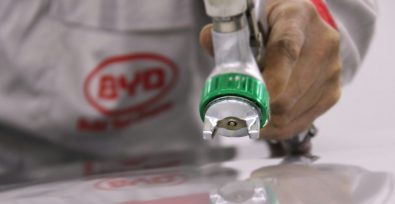Brazilian labor inspectors have uncovered serious violations at the construction site of a new factory for Chinese automaker BYD, sparking an investigation into alleged forced labor and human trafficking. The site, located in the northeastern state of Bahia, is slated to become BYD’s largest electric vehicle plant outside of Asia.
Federal prosecutors revealed that 163 Chinese workers employed by BYD’s contractor, Jinjiang Open Engineering, were subjected to “slave-like conditions.” A government statement described the workers as “victims of international trafficking for the purpose of labor exploitation.”
Alarming findings at the construction site
Labor inspections conducted since November found degrading living and working conditions, including inadequate accommodations and withheld wages. Workers reportedly slept on beds without mattresses, shared a single bathroom among 31 people, and endured long hours of labor under harsh sun exposure.
“The conditions identified at the site are completely unacceptable,” stated a representative of Bahia’s regional Ministry for Labor and Employment (MPT). “We are committed to ensuring the workers are properly compensated and treated with dignity.”
France24 reports,
The MPT added that it suspected “forced labor,” with workers’ passports confiscated and their employer “retaining 60 percent of their salary.”
BYD terminates contractor amid accusations
Following public disclosure of the findings, BYD, which has previously been linked to the Uyghur forced labor system, announced it had severed its contract with Jinjiang’s subsidiary responsible for construction. The company arranged hotel accommodations for the affected workers and pledged cooperation with authorities.
However, BYD’s spokesperson, Li Yunfei, pushed back against the allegations, characterizing them as part of a broader campaign to damage the company’s reputation. “We have seen how certain foreign forces maliciously collaborate to smear Chinese brands and undermine China-Brazil relations,” Li wrote on the social media platform Weibo.
Jinjiang also denied the accusations, calling them an affront to the dignity of Chinese workers. Despite these denials, Brazilian authorities have maintained their stance, suspending construction at parts of the site and requiring immediate remedies.
Next steps in the investigation
Authorities have instructed Jinjiang to register the workers in Brazil’s tax system to ensure proper payment and to arrange for the repatriation of seven workers set to return to China. A follow-up hearing is scheduled for January 7, during which both companies are expected to present corrective measures.
China’s Ministry of Foreign Affairs responded cautiously, stating it was verifying the situation. Spokeswoman Mao Ning emphasized, “China attaches great importance to protecting laborers’ legitimate rights and interests and requires Chinese enterprises to operate lawfully.”
This case highlights ongoing concerns about labor rights violations in international projects and raises questions about corporate accountability in global supply chains. As investigations continue, it remains to be seen how this controversy will affect Brazil’s economic collaborations with Chinese companies.
BYD has sidestepped accountability for its role in the Uyghur forced labor system despite the Freedom United community calling on the company, as well as other auto giants, to end their complicity in Uyghur forced labor. We hope that BYD cuts ties with forced labor in all its forms and commit to ethical practices throughout its operations.







Freedom United is interested in hearing from our community and welcomes relevant, informed comments, advice, and insights that advance the conversation around our campaigns and advocacy. We value inclusivity and respect within our community. To be approved, your comments should be civil.
Es sabido que la explotación laboral es común en china. Deben respetar la dignidad humana y no permitir estas cosas. Lamentablemente los chinos están avanzando por todo el mundo, implementando sus formas de vida y cultura.